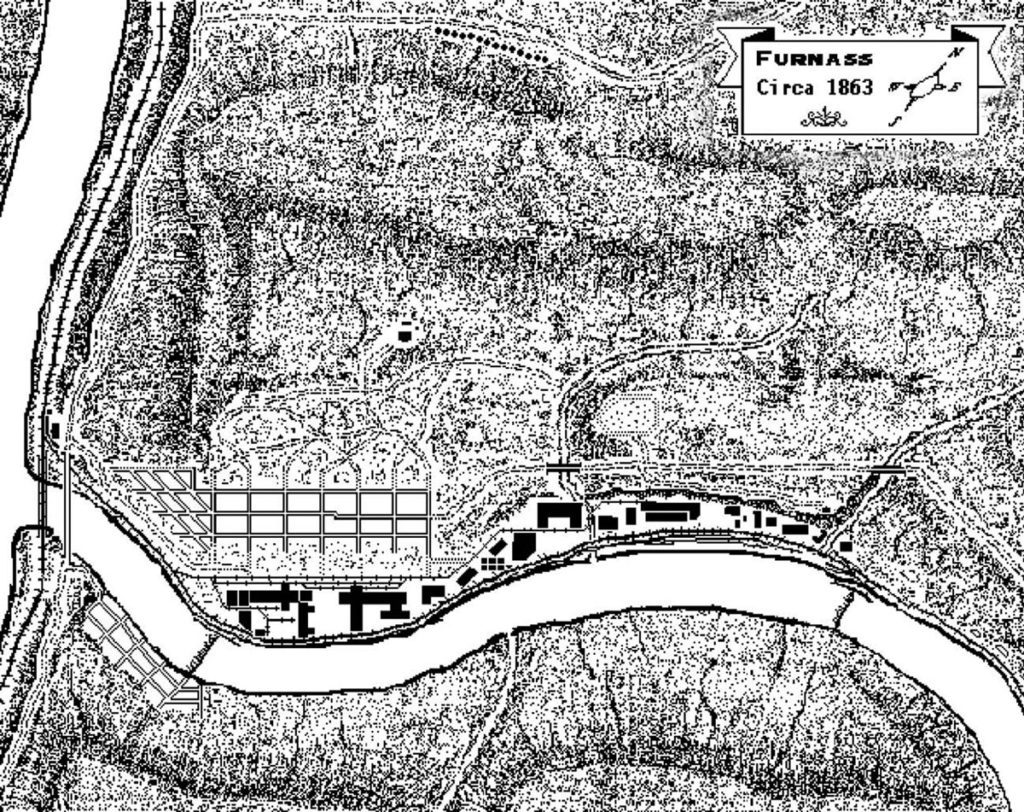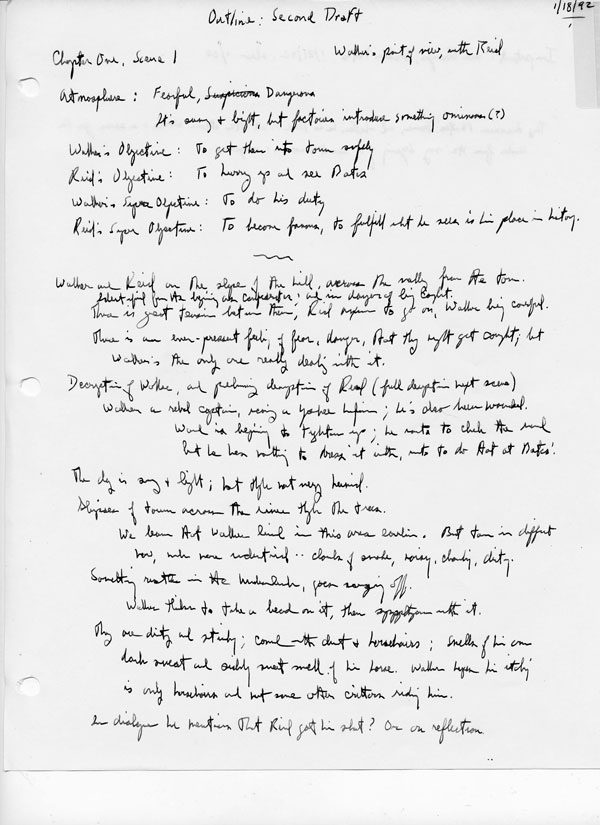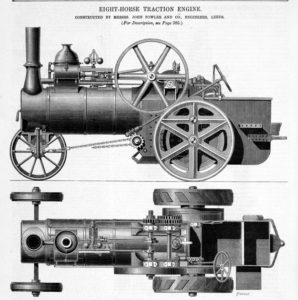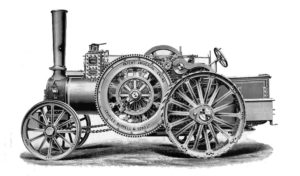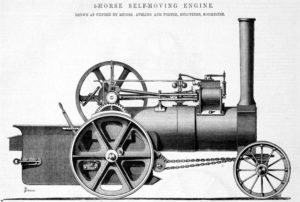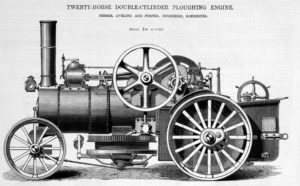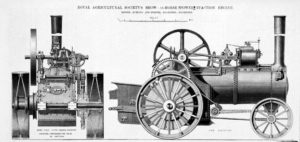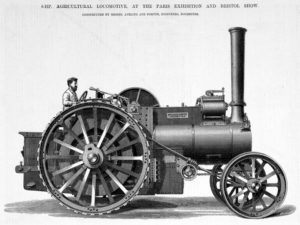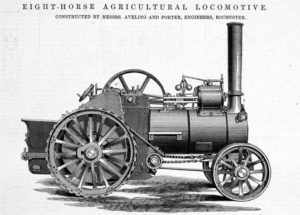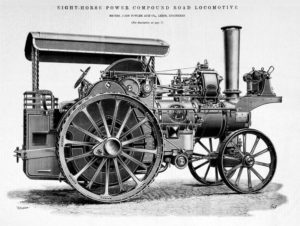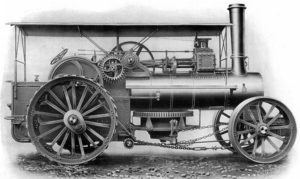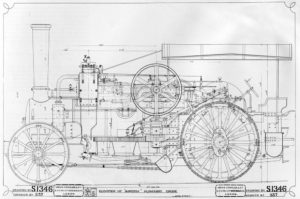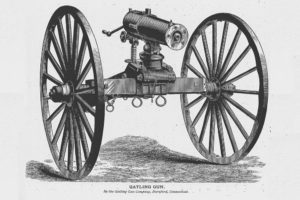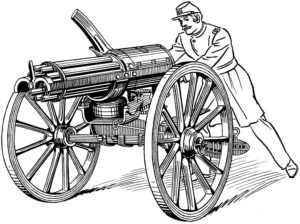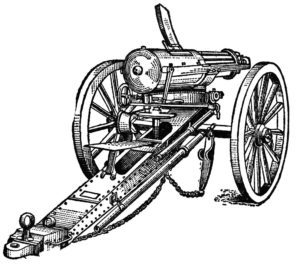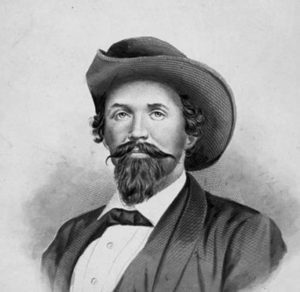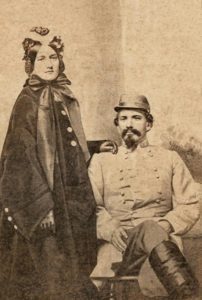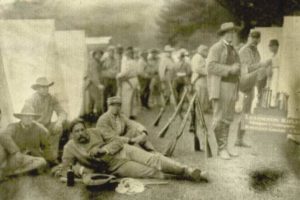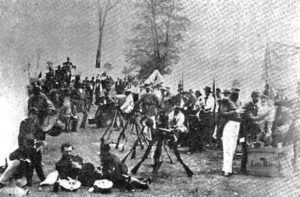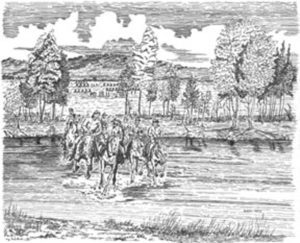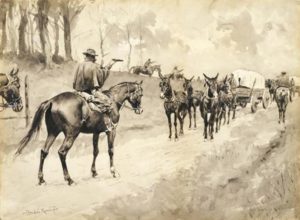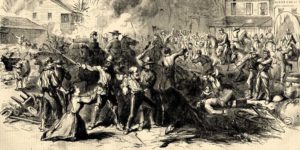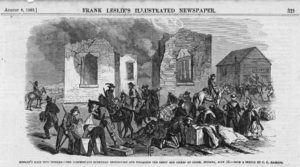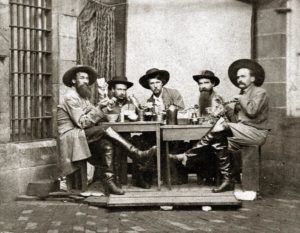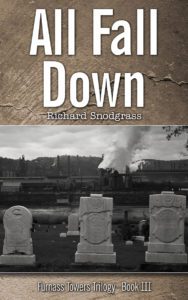In the summer of 1863, Judson Walker, a captain of Morgan’s Raiders, and Jonathan Reid, a young engineer, come to Furnass to appropriate two of Colin Lyles’ steam-powered road engines. The purpose is to outfit the engines with iron plate and the newly developed Gatlin Guns, and, with Morgan, deliver the war engines to General Lee’s army in Central Pennsylvania. Amid Walker’s growing involvement with Lyle’s wife Libby, deserting soldiers, and Reid’s own agenda, Walker learns Morgan isn’t coming. The novel reaches its climax with Lyle trying to sabotage the war engines. Walker must decide between Libby and duty toward his men, the war and individual human values.

Videos
About Book Four
Reader’s Guide to ACROSS THE RIVER
Summary
When Confederate soldiers Jonathan Reid and Judson Walker are assigned a confidential mission in the midst of the American Civil War, they are sent to the fictional town of Furnass, Pennsylvania, to strike a wartime deal with desperate Keystone Steam Works owner Colin Lyle. Masquerading as Union troops, they are ushered graciously into the home of Lyle and his wife, Libby, but soon realize that the house’s residents harbor several secrets. While Reid focuses his attention on ensuring that the deal is successful and fits the needs of the Confederacy, Walker—secretly a Furnass native—quickly finds himself entangled in the Lyles’ lives, growing closer to Libby and, consequentially, to uncovering several truths about the place he once knew. While the struggle between the North and the South wages on, so, too, does the battle between belonging and alienation, between love and indifference, and between defiance and ignorance in the lives of the people of Furnass. A virtuosic work of historical fiction, Across the River combines the experiences of imagined characters and real-life figures into an engrossing work dealing with matters of deception, power, and ethics in the lives of soldiers and civilians alike.
Questions and Topics for Discussion
- Would you characterize Libby as more of a northerner or southerner, especially within the context of the 1860s? Did your opinions on this change as you read? Why?
- How does the author successfully incorporate historical figure John Hunt Morgan into the story? How does he treat him differently from the fictional characters?
- In each of his Furnass Towers novels, Snodgrass uses italic passages to add an omniscient point of view to the narrative. How does his use of italics in Across the River differ from such passages in his other works?
- Some of the most recognizable titles in fiction, including Gone with the Wind, by Margaret Mitchell, and Cold Mountain, by Charles Frazier, are set against the backdrop of the American Civil War. Discuss how Across the River treats the war compared to these novels.
- During a heated discussion, Walker questions whether Colin “had to have a slave of some kind,” to which Libby replies, “I think most people do, in one form or another. Someone to do your bidding, someone or something to have dominion over.” Do you agree with this statement within the context of the novel? In present-day America?
- Discuss the similarities and differences between Reid and Walker and how they seem to view their mission as the novel progresses. What do you think are the primary reasons for their differences?
- At one point in the novel, Reid asserts, “I would much rather be disappointed than to know that I settled for less. Than to know that I could be satisfied to be second-rate.” Do you find yourself agreeing with this statement in your own life? Are there any exceptions—any situations in which you would willingly settle for less?
- Aside from the specific context of the American Civil War, how do you view the ethics of Reid and Walker’s mission? Discuss how these views correspond to your thoughts on the ethics of war in general.
- Why do Colin and McArtle react so differently to Reid and Walker’s presence in Furnass? Examine how their backstories, as well as their relationship with each other, contribute to this contrast.
- For what reasons does Sally’s assessment of Walker change so drastically as the story develops? In what ways are Sally’s actions an indication of Walker’s evolving role in the Lyle household?
Background
Reviews, Extra Scenes, etc.
“The writing is beautiful. The complex characters, faced daily with choices between their deepest desires and their integrity, in the midst of war, make compelling reading. This book stands alone, while stoking the desire for rest of the books in the series.”
– IndieReader
“A vivid and intensely personal story couched within the chaos, madness and sacrifice of the Civil War.”
– SPR
“A beautiful historical novel that proves history is created and changed by individuals, not just events.”
– IndieReader
Full Review – Self-Publishing Review (SPR)
In Across the River, author Richard Snodgrass creates a vivid and intensely personal story couched within the chaos, madness and sacrifice of the Civil War. The two main characters are involved in a clever plan to turn the tide of the war for the South, but there are countless obstacles that stand in their way, including one another.
Walker and Reid are an unlikely pair who don’t seem to like one another all that much, but they’re both driven by loyalty and sincere belief in their cause…at first. They have been tasked to cross into enemy territory and acquire two steam-powered road engines, also known as “war machines,” and deliver them to the Southern troops. Equipped with advanced weaponry and plate protection, these machines could change the course of history.
While the premise of the plot may seem simple, the details are anything but, with Walker and Reid’s personalities and proclivities getting them into hot water numerous times with the townsfolk. Trying to keep a low profile is also difficult when Walker decides to pursue the wife of the man, Colin Lyle, whose engines they need so desperately.
The key moments of the story have little to do with the arrival of Morgan or the ultimate success or failure of the mission. Instead, the beauty of this story emerges from the in-between moments: the small conversations and sidelong glances, and the tension that imbues each page and the sharp dialogue of true conversation. Snodgrass shows himself to be a master storyteller and creates scenes so tangibly you can almost smell the leather of the saddles. This isn’t an action-heavy plot, but it doesn’t need to be. The suspense that builds up about these characters’ true identity, and intentions, builds steadily from the very first pages and rarely lets up, pushing boundaries of loyalty, love, country, and humanity.
The colloquial style of the narration is consistent and immediately immersive, and the prose works as a perfect time machine for readers looking to get lost in a historical setting. A great deal of research clearly went into developing this story, and there are few plot holes where the history seems overly fictionalized. There is an excellent balance of exposition and plot progression, so while not much happens over the course of each chapter, readers are constantly learning and sinking deeper into the context of the tale. The characters are so thoroughly developed that it becomes impossible not to root for them – both the bad guys and the good ones.
The only real stumbles come from the technical side of the writing. From missed quotation marks and sloppily edited sentences to syntax issues and awkward phrasing, a final sweep of the text could help to perfect the flow of writing. There are so few weak moments in the story itself that even small technical errors tend to stand out. As a whole, however, Across the River is an in-depth and keenly constructed peek at a small moment of the past – a critical and impactful series of events that could have changed everything, but didn’t.
Full Review – Kirkus Reviews
A Confederate spy becomes caught between duty and love in this Civil War drama.
In 1863, Judson Walker, a Confederate captain and a member of the infamous Morgan’s Raiders, is sent to Furnass, Pennsylvania—deep in enemy territory—on a sensitive mission disguised as a Union officer. Jonathan Reid, an engineer, accompanies him. The two are tasked with determining if the road engines invented by Colin Lyle could be modified to make Gatling guns even deadlier, a technological innovation that could sway the outcome of the war. Walker does his best to keep up the ruse that he’s a Union soldier despite his Southern accent, since “if someone exposed him right now as a Southern spy,” there were people who “would probably run from their houses and beat him to death, tear him limb from limb for being a traitor.” Walker frets anxiously that Libby, Colin’s wife, suspects him—she too is a Southerner, originally from South Carolina, and quickly detects his accent—but he also begins to have irrepressible feelings for her that could compromise his operation. Meanwhile, Reid observes Walker’s growing attachment to Libby and is confronted with the possibility that he’ll have to take matters into his own hands. Snodgrass (All Fall Down, 2018, etc.) sensitively investigates the ways in which the lines between the North and South could be hazily drawn—Walker realizes that “by some definitions he was a Northerner himself.” Reid loathes Walker for his incarnate representation of everything wrong with the South, “the backwoods mentality, the backwater view of the world.”
The author’s meticulous, measured prose is well-suited to his principal literary task: the depiction of ambiguity that resides in the interstices between heavy-handed extremisms. Walker is a grippingly complex character. An educated man—he’s a lawyer—he’s willing to risk his life for the South, but he’s hardly an ideological partisan. And Colin, too, is more layered than he at first seems—a scientific fanatic, he’s so committed to his invention he’s either incapable or unwilling to notice the electricity between Libby and Walker. But despite Colin’s professional commitments, he’s not coldly rational either: “Maybe that’s why I find machines easier to deal with than people. When a machine doesn’t do what you want it to, you simply make a new gear or whatever. Maybe someday we’ll be able to make one for the human heart.” Snodgrass artfully infuses the plot with tantalizing suspense that feels like a cord pulled taut that could break at any moment. This is not a formulaic rendering of the distance between the personal and the obligatory but something deeper and more profound. Walker’s burgeoning love for Libby compels him to re-evaluate the very nature of his obligations, as if his feelings produced a new clarity. The author’s impressive achievement is to upend the simplistic interpretation of the Civil War: two sides warring against each other out of perfectly confident and implacable hate.
A thoughtful and powerfully written war novel.
Full Review – IndieReader
For readers looking for complex characters set against the dramatic backdrop of the Civil War, Richard Snodgrass’s ACROSS THE RIVER is a beautiful historical novel that proves history is created and changed by individuals, not just events.
Author and photographer Richard Snodgrass’s lush historical novel ACROSS THE RIVER is part of his series set in the fictional west Pennsylvania mill town of Furnass. This volume deals with Morgan’s Raiders in the Civil War, and their plan to convert Colin Lyle’s “road engines” into war machines.
Captain Judson Walker’s mission is to deliver engineer Jonathan Reid to Furnass, so he can build on the technology created by Colin Lyle of Furnass. Walker’s men will join them to transport the engines & Morgan will rendezvous with them. They’re posing as government agents on a secret mission. The two men don’t like each other, but they are bound by their loyalty to the Confederacy.
Walker is there to get the job done. Reid’s purpose is far grander. “Reid was very much aware that, if the Confederacy has any long-term hope of survival, it required men of quality and intelligence who understood all the changes that made up the modern world.”
Human complications raise the stakes. Colin is desperate for the commission — and for the recognition he believes his road engines deserve. Desperate enough to pretend to believe these Southern men in Yankee uniforms are on a Union government mission. Colin’s wife Libby, a South Carolinian by birth, is unhappy in her life and marriage, and drawn to the wounded Captain Walker. Walker’s tumultuous history with the ego-driven John Morgan, who married the woman Walker loved, influence some of Walker’s decisions.
The writing is beautiful. The complex characters, faced daily with choices between their deepest desires and their integrity, in the midst of war, make compelling reading. This book stands alone, while stoking the desire for rest of the books in the series. Although the sensory detail makes the setting immediate, sometimes there is too much backstory dumped in a clump rather than woven into the scene. Sometimes, characters’ interior meanderings are more than is needed in that moment, and slow down the narrative drive. The story unfolds slowly, even though action sequences are well rendered, but the ending feels abrupt in contrast to the rest of the piece.
For readers looking for complex characters set against the dramatic backdrop of the Civil War, Richard Snodgrass’s ACROSS THE RIVER is a beautiful historical novel that proves history is created and changed by individuals, not just events.
~Eva Schegulla for IndieReader
Original Opening of Novel
In early summer of 1863, two riders — two Confederate horsemen, the one in the lead dressed in a Yankee cavalry officer’s uniform, the one following in a dark broadcloth suit and derby hat — made their way down the steep slope of a valley in enemy territory in Western Pennsylvania. Afternoon sunlight cracked through the branches overhead. The hills were thick with trees, white oak and maple and hickory, a hundred shades of green, softening the contours of the valley. Even in the shade, the day was hot and dry. The two men were covered with dust, their clothes prickly, small insects circled them like auras. Because of the trees, the two riders were hidden from view of the town across the river; but the trees also prevented the riders from getting a good look at the town.
Introduction for Original Opening
As with all of my novels, Across the River went through a number of rewrites, revisions, etc., over the years. Research for the book began in the late 1980s, with the first draft being written in 1992 – 1993. The following is the original opening for the book. At the time I was concerned about setting the scene—the town of Furnass and the Keystone Steam Works—in the 1860s, as well as establishing the characters of Judson Walker and Jonathan Reid, the relationship between them, and the background of why they had come here. But when I looked again at the story several years later, I realized that the opening moved much too slowly, that it was more compelling to allow the explication to come out as the story developed. Well, we live and learn—hopefully. Still, you may find comparison of the two openings of interest, if only as an example of the creative process and how this particular writer went about deciding what to include and what to leave on the cutting room floor.
I’m also including here the original sketch notes I made for this section. I’m happy to say that as with any good sketch, outline, or plan, the value was in the making of it. When it came to finalizing the book, it was time to throw the original intentions aside and let the story itself determine where it was going and why.
